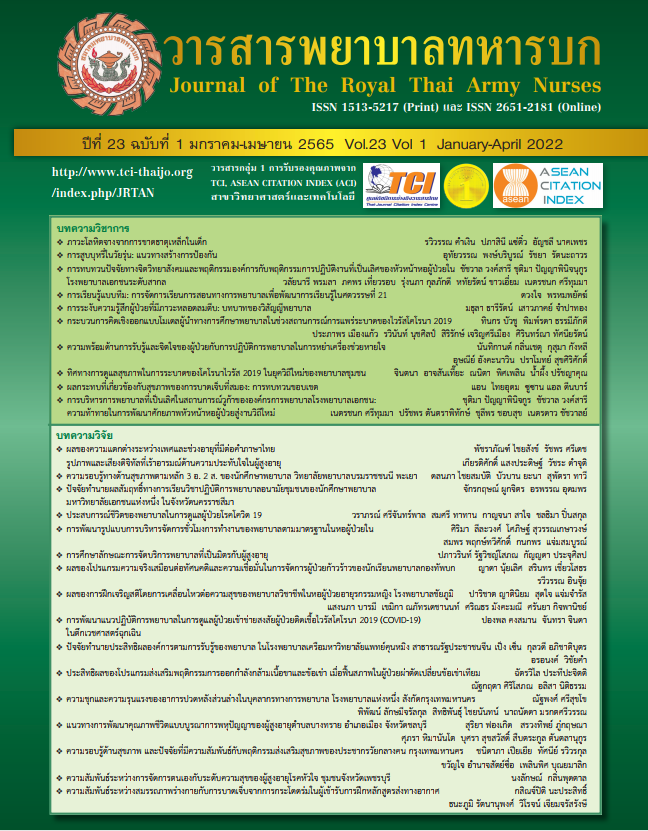The Effects of A Life-Skills Training Program on The Coping Strategies of Bullied Middle School Students
Keywords:
Coping strategies, Life-skill training, Bullied-middle school studentsAbstract
This quasi-experimental research, using a two-group, pretest-posttest design, examined the effects of a life-skill training program on coping strategies for bullied middle school students. The samples were comprised of 62 middle school students that had experienced bullying, randomly assigned to an experimental group of 30 students and a control group of 32. The experimental instruments were 1) Life-skill program 2) data collection tools were 2 parts questionnaire 2.1) The Revised Olweus Bully/Victim Questionnaire and 2.2) coping strategies scale. Descriptive statistics were used to represent participants’ personal information; a dependent t-test was used to compare the mean of coping strategy scores before and after intervention for each group; and an independent t-test was used to compare the mean coping strategy scores between the experimental and control groups.
The results of the study were as follow. 1) After participating in the life-skills training program, the mean scores for the coping strategies of the experimental group (M = 102.83, SD = 19.59) was significantly higher than before program participation (M = 80.13, SD = 18.39) at a statistical significance of (t = 7.8 p<.001); and 2) after participating in the life-skills training program, the mean difference in the mean score for the coping strategies between the pretest and posttest in the experimental group (= 22.70, SD = 15.89) was higher than that of the control group receiving routine care (
= -1.65, SD = 18.78), at a statistical significance (t = 5.494, p<.001). These findings suggest that a life-skills training program may effectively increase the coping strategies of bullied middle school students.
Downloads
References
Olweus, D. Bullying at school and later criminality: Findings from three Swedish community samples of males. Criminal Behaviour and Mental Health. 2011; 77:151-6
Chanralaksana N, ThaweekoonT., Sangon S. factors predicting depression in secondary school students. The journal of psychiatric nursing and mental health. 2015; 29(2): 128-143. (in thai)
Laeheemk. Bullying behavior among primary school students in Islamic private school in Pattani province. Social Sciences. 2013; 34(3): 500-513. (in thai)
Olweus D. Bullying or Peer Abuse at School: Facts and Intervention. Current Directions in Psychological Science. 1995;4(6):196-200.
kittilarpsombatsiri. Thailand Global School-based Student Health Survey. Ministry of Public Health. 2015; 3: 1-2.
Panyawong W. Prevention and response of bullying in school. Journal of mental health of Thailand. 2019;27(2): 133-144. (in thai)
Sakarinkhul C, Wacharasindhu A. Prevalence of bullying and associated psychosocial factors among lower secondary school students in muangchiangmai.Journal psychiatry assoc Thailand. 2014;59(3): 221-230. (in thai)
Vili W, Nildum S. Cyberbullying behavior among secondary students in chiang rai provice: a case study of chiang rai municipality school 6. Communication Chiangrai Rajabhat University. 2018;1(2):1-24. (in thai)
Kim, Y. J. The role of self- esteem in the relationship between depression and suicidal ideation of Korean adolescents. Life Science Journal. 2014; 7: 494–498.
Abdollahi, A., Talib, M. A., & Yaacob, S. N. Problem-solving skills and suicidal ideationamongMalaysian college student. The Mediating Role of Hopelessness. Academic Psychiatry. 2016;40(2): 261–267.
Kowalski, R., & Limber, S. Psychological, Physical, and Academic Correlates of Cyberbullying and Traditional Bullying. The Journal of Adolescent Health: Official Publication of the Society for Adolescent Medicine.2013;53(1): 13-20.
Patchin, J., & Hinduja, S. Cyberbullying and self-esteem. Journal of School Health. 2010; 80(12): 616–623.
Pradubkaew S, Samawathdahna R, Effeccts of life skills program management on ability of coping with emotions of lower secondary school student. An online journal of education. 2015;10(2):308-321. (in thai)
Beran, anya N., & Li, Q. The relationship between cyberbullying and school bullying. Journal of Student Wellbeing. 2007; 1(2): 15–33.
Kupferberg, A., Bicks, L., & Hasler, G. Social functioning in major depressive disorder. Neuroscience and Biobehavioral Reviews. 2016; 10(69): 313-32.
World Health Organization [WHO]. Life skills education in schools. Geneva: World Health Organization. Research gate. 1993.
Pranjic N, Bajraktarevic A. Depression and suicide ideation among secondary school adolescents involved in school bullying. Primary Health Care Research and Development. 2010; 11(4): 349-362
Tapanya S. Study to develop a sustainable violence prevention model in children. National health foundation supported; 2007. (in thai)
Olweus D. The Revised Olweus Bully/victim Questionnaire.1996
prateepteranun W, Lueboonthavachai O. The effects of empowerment program on coping ability of suicidal attempters. The journal of psychiatric nursing and mental health. 2015; 29(2): 103-115. (in thai)
Lazarus, R.S. and Folkman, S, Stress, appraisal and coping. New York: Springer. 1984.
Jalowiec, A., Murphy,P., and Power J. Marjories, Psychometric assessment of Jalowiec coping scale. Nursing Research.1984; 33(3)
Phuipha T, Bunthumporn N, Vuthiarpa S. The effect of a life-skill training program on the depressive symptoms of senior high school student. Journal of the royal thai army nurses. 2018; 19 (supplement) :89-98. (in thai)
Kirdin S, Vuthiarpa S, & Bunthumporn N. Effects of life skills program on knowledge and life skills to prevent sexual assault in female secondary school students. The journal of psychiatric nursing and mental health. 2019; 33(1): 128-145. (in thai)
Downloads
Published
How to Cite
Issue
Section
License
Copyright (c) 2022 Journal of The Royal Thai Army Nurses

This work is licensed under a Creative Commons Attribution-NonCommercial-NoDerivatives 4.0 International License.
บทความหรือข้อคิดเห็นใดใดที่ปรากฏในวารสารพยาบาลทหารบกเป็นวรรณกรรมของผู้เขียน ซึ่งบรรณาธิการหรือสมาคมพยาบาลทหารบก ไม่จำเป็นต้องเห็นด้วย
บทความที่ได้รับการตีพิมพ์เป็นลิขสิทธิ์ของวารสารพยาบาลทหารบก
The ideas and opinions expressed in the Journal of The Royal Thai Army Nurses are those of the authors and not necessarily those
of the editor or Royal Thai Army Nurses Association.






